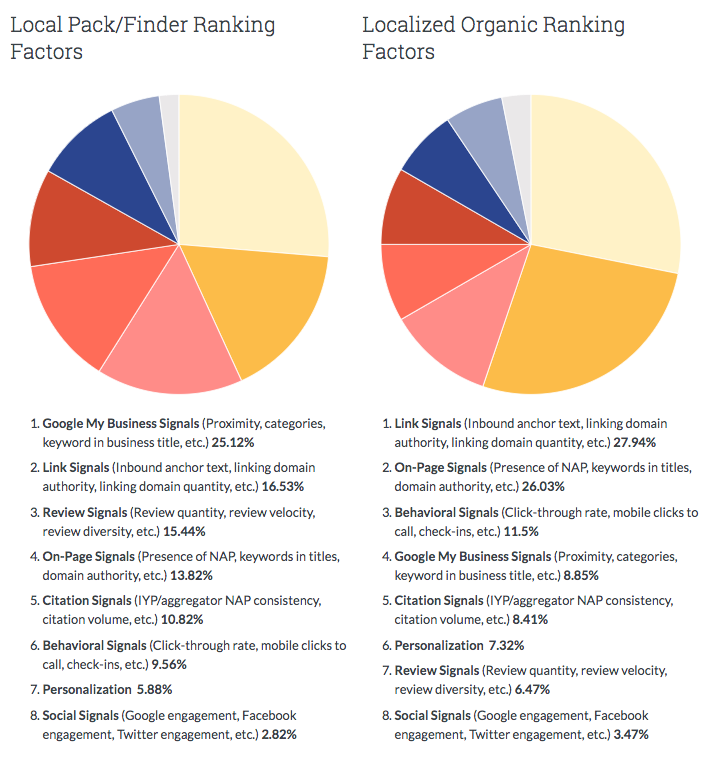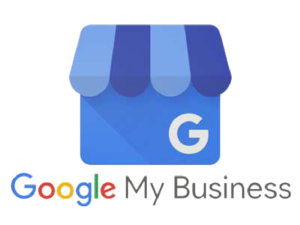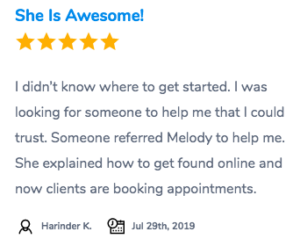How to Get More Local Business
Melody Campbell | Posted on |

"If your ideal prospect can't find you and your business when looking for what you DO or PROVIDE, especially when they don't know who you are yet - you're not getting your share of the local business!"
Guided by the following three directives in businss - Connect, Follow up, and Follow Thru
- How Latina Magazine’s Ideal Customer Persona Drives Success - July 26, 2024
- Understanding the Ideal Customer Persona - July 25, 2024
- Embrace Forward Momentum: The Key to Sustained Growth in Business - April 4, 2024
Thank you for reading this post, don't forget to subscribe!
Get More Business Show – Episode 1
This first episode of the Get More Business Show, I’ll be doing an overview of the Online Presence Audit that I provide for local businesses. I offer this audit at no charge.
The purpose of the audit is to provide a 30,000 foot few of the five basic and most important factors for the local business owner so he or she can better harness the power of the web to promote the business.
Request your Free Online Audit

The Online Presence Audit that I conduct for prospects and client focus on five of the top local search ranking factors as presented by MOZ, software as a service company based in Seattle that produces an annual report on the state of Local Search.
- Google My Business Page Signals
- Backlinks & Citations
- Reviews
- Social Media
- Website On-Page Signals
Google My Business Page

Updating the business entry in Google My Business will practically guarantee the accuracy of the business’s information in Google, and by extension, any third-party apps or services that rely on Google to get their data. Business owners have the chance to update your business’s name, address, phone number, and specific details as the business open hours. Business owners manage the representation of the business further with posts and images. Businesses can even offer direct access for clients to book an appointment for services.
The business owner is also provided the opportunity to post common questions and answers about the business which, if done right, can further draw the search visitor to the business website to discover further solutions. Or they may find the answers on Google My Business Page and take action from there to call or visit the business directly.
The business informational consistency is invaluable to make sure customers are contacting you at the right times and getting an accurate representation of your business and the solutions you provide.
Link & Citation Signals
A local citation is any online mention of the name, address, and phone number for a local business. Citations can occur on local business directories, on websites and apps, and on social platforms.
Local business listings and citations play an important role in reputation, search rankings, and ultimately revenue. That’s why it’s critical to see the big picture of their purpose. The most important thing to remember is that local business listings are extremely powerful.
- Local citations impact local search engine rankings. The number of citations a business accrues, the accuracy of the data they feature, and the quality of the platforms they exist on all influence rankings. Search engines like Google amass data about each business. If what they encounter is accurate, the search engine trusts the validity of the data, which is believed to strengthen the business’ chance of ranking well. However, if the data search engines encounter is inconsistent, this trust is eroded, lessening ranking opportunities.
- Local citations impact consumers. Accurate citations help people discover a local business, which can result in web, phone, and foot traffic, culminating in transactions. Inaccurate citations, however, can misdirect customers, leading to a loss of reputation and revenue.
Review Signals
Very simply, an online local business review is written sentiment left directly by a customer on any website or platform that supports this type of content. Google and Facebook are two of the major review platforms, but there are numerous other options that may be general (like Superpages or Bing) or specific to an industry or geography (like TripAdvisor or HealthGrades). Reviews represent an ongoing conversation your customers are having about your business on the web.
91% of 18-34 year old consumers trust online reviews as much as personal recommendations.
Google has expressed the three factors their algorithm uses to provide search results are
- Relevance – how well your business matches the search words and intent
- Proximity – how close is your business to the location of the search
- Prominence – Online prominence, meanwhile, is based on the accuracy and quantity of information available on the web about your business. This includes the quantity and quality of your online reviews

Social Signals

Social signals refer to your businesses collective social media engagement – shares, likes and overall social media visibility as perceived by search engines. These activities (not just your profile) contribute to a page’s organic search ranking and are counted as a form of citation.
Website On Page Signals
Does your website contain content relevant to the search visitors search phrase and intent? Your content, i.e. the purpose of your web page should be directly stated in all of the following areas:
- Title tag
- Meta Description: The website or page description snippet that shows up on search results
- URL
- Content of page i.e. description of who you are, what your business does, and possibly answer the visitor questions that initiated the search)
- Image alt text (remember search engines cannot “read” images that included your address and phone number as a graphic) Alt Text is in your website source code and provides a text description of the image for search relevance.
These plus a couple of other factors (this list of 5 are the ones we look at in the audit) are important foundational ranking factors, as well as competitive difference makers.
The Power of the Web – Done Right!
In the last month, I’ve been researching the online presence of a few hundred attorneys, all with different practice areas. There have been one or two (out of hundreds) that really stood out as having understood the power of their online presence.
The typical attorney website is all about the law firm and the attorney’s that belong to this firm.
On the home page is usually either a large image of their beautiful building or some image that represents “legal” such as a gavel or the courthouse.
There is an “About us” page with a short bio of the attorney(s). There is often a section describing the practice areas represented by the attorney(s) at the firm – family law, estate planning, civil defense, etc.
And, there’s a “Contact us” page where the address, phone number of the firm, and a Google Map Pin which when clicked on leads to directions. And there’s usually a form that can be filled out with the visitor’s name, email address, phone number and space for comments or questions.
Sometimes there are social media links somewhere in the header or footer of the website that is linked to social profiles. Sometimes the social profiles haven’t been posted on for several years and others have occasional posts each month.
The “unicorn” or rare find is the law firm that understands that their visitor is not coming to the website to find out about the attorney. No, the smart attorney understands that their visitor is at the law firm’s website to find a solution to a problem. Of course, the visitor will want to know how to contact the attorney – that’s a given – but almost never the primary reason for clicking through from Google’s Knowledge Card, the search results which presents the name, address, phone number and hours of all business found in search.
This month I found the “unicorn” website for a law firm that represents family law among other specialties. Here’s an example of the messaging on the home page of the website which is focused on the needs visitor:
Families come to _blank firm_ at pivotal moments in their lives. They may be hurting, distraught, anxious or angry. Whether they’re separating, remarrying, welcoming a new life, or seeking counsel in other family matters, it’s critical to have an advocate who understands the intricacies of the law and knows how to communicate their interests. When the dust settles, clients want the best possible outcome—and this is exactly what _blank firm_ provides.
Quote from the “Unicorn” rare find website
Do you hear how this message is more about the visitor than it is the attorney?
Throughout this website, the visitor is invited to “Talk to an Attorney”. The link doesn’t take the visitor to a page where only basic location and contact information is listed. No, the visitor is presented with a video where the imagery is a concerned woman in her kitchen pouring herself a cup of coffee. The scene breaks to the attorney entering his law firm as he begins speaking about why he became an attorney – to help people to solve problems.
Below the video is an elegant form where the visitor is invited to “Tell us how we can help”. Below the contact form, the firm’s consultation process is depicted with visitor-centric images and a description of a simple 4-step process.
Because of the tools I use in my research, I am aware that this page uses the Facebook Pixel. This means that the firm’s website deposits “cookies” or a small snippet of code onto the device and the web browsing history being used by the visitor. Of course, this firm is in compliance with its GDPR representation on page to let the visitor know that the website uses code to track and respond to visitors. The visitor is given an opportunity to accept these terms or leave the website after reading this GDPR notice.
The important thing to note in the scope of this post is that because of the Facebook Pixel this firm is able to “retarget” every visitor that comes to their website. As the visitor, who is also a Facebook user, is socializing with the friends and groups they would normally engage with, an ad is presented relevant to the topic researched when they visited the law firm’s website.
Of course, having visited the website during my research the “cookies” or code represented by the Facebook pixel was deposited in my browsing history.
Later that day I was presented with an ad inviting me to “learn more” about the “Common Questions: Understanding Child Support” and how it works in Oregon & Washington.
If I had been one of their ideal prospects – the majority of their website visitors are exactly that – this offer would have been right on target to provide me with a solution. The fact that I came to their website is established by the Facebook Pixel, and all of the information in my profile, while not made available to the law firm, identifies me within their demographic criteria, presumably a female with children.
The Power of the Web – your business website, it’s content, your social media presence, podcasts, videos and paid ads have the POWER to speak to your ideal prospect and influence their thinking with your solutions and processes. These simple tools give you the means and opportunity to establish your business as the only reasonable choice to meet their needs.
Why would you simply give the visitor to your website just your contact information when you could exercise the power of influence to help them make a good choice by selecting you and your company to solve their problems?